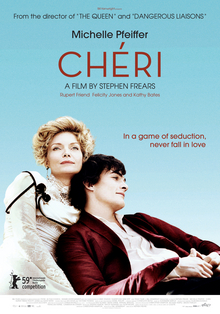Though mildly entertaining and only sporadically witty, “Cheri” is not “Dangerous Liaison,” and it’s not “The Queen,” Frears’ last, Oscar-winning film, either. Overall mediocre, “Cheri” occupies a minor position in Frears’ oeuvre over the past 25 years.
Main reason to see the picture is the powerful performance from Michelle Pfeiffer, who has not been seen on the big screen for years. At 50, aging gracefully, Pfeiffer looks terrific, and she is well cast as an aging, cynical courtesan who discovers real love despite her character’s advancing age, vanity and other personal and social obstacles.
World-premiering at the 2008 Berlin Film Fest, “Cheri” will be released by Miramax in late June as counter-programming to summer’s top guns, all those big-budget, special effects driven blockbusters. Whether there is a theatrical audience for such fare, made for mature viewers, remains to be seen, but critical response should be mixed.
Based on the novella by the French writer Colette (better known for “Gigi,” which Minnelli made into an Oscar-winning musical in 1958), the tale is set at the turn of the century, in Belle Époque Paris, centering on a scandalous romp. The ravishingly beautiful Lea (Michelle Pfeiffer) contemplates retirement from her renowned stature as Paris’s most envied seductress to the rich and famous glitterati. But we all know that something or somebody will delay those honorable plans.
Indeed, Lea’s intent is cut short when she is approached by a former courtesan and archrival, the witty gossip Charlotte Peloux (Kathy Bates, possibly miscast), who encourages Lea to teach her disaffected 19-year-old son, nicknamed “Chéri” (Rupert Friend), about the ways of the world, that is, how to court, treat and deal with women.
Quite expectedly, the sporadic encounters evolve into something deeper and more erotic than a series lectures or lessons. Soon, their escapade leads power struggles and intrigues over sex, money, age– and love itself.
Strangely, the affair between Lea and Cheri goes on and off for years, much to the chagrin of his manipulative mother, who has other ambitions for her dependent son, aiming to match him with the beautiful, innocent, and much younger Edmee, who’s only 18 (Felicity Jones).
Cheri begins as an immature man, a boy who refuses to grow up, who collides in more ways than one with a femme du monde who age-wise could be his mother and who’s smart enough to know that she can’t forever stay young, beautiful, and desirable.
Problem is, the narrative is too simple—it’s based on one idea–lacking nuance and secondary characters. It’s basically a two-handler drama with few supporting characters in the background that serve as sort of decorations. Fortunately, the drama gets better as it goes along and the tragic ending is quite emotionally touching. The movie will also suffer from inevitable comparisons with the far superior “Dangerous Liaisons,” which was richer and wittier in both text and subtext.
Even so, Pfeiffer, whose role bears slight resemblance to that of Glenn Close n “Dangerous Liaisons” renders a solid performance that grounds the film in some much-needed emotional poignancy. It’s a mystery why this gifted actress doesn’t perform more often than she has over the past decade.
Greeted with negative revies, Cheri was a commercial failure, earning $9.4 million against a budget of $23 million.
Credits:
Directed by Stephen Frears
Screenplay by Christopher Hampton, based on Chéri and The Last of Chéri by Colette
Produced by Andras Hamori, Tracey Seaward, Thom Mount
Bill Kenwright
Cinematography Darius Khondji
Edited by Lucia Zucchetti
Music by Alexandre Desplat
Release dates: February 10, 2009 (Berlinale)
Running time: 92 minute











